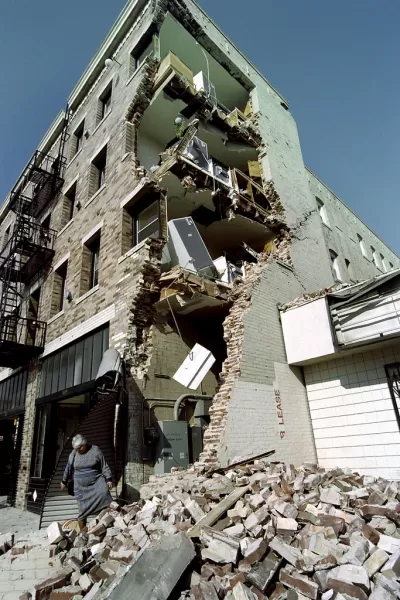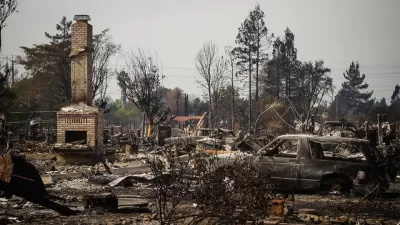Cities like San Francisco and Los Angeles already keep lists of vulnerable buildings, but a new piece of legislation would require all California cities do the same. The catch? The bill will not provide funding to support these lists.

Experts can spot certain tell-tale signs of earthquake vulnerability right away, but for those who aren't experts it can be harder to identify possibly dangerous buildings. "Now the Legislature has sent to Gov. Jerry Brown a bill that would require cities and counties in the state’s most seismically vulnerable areas to create lists of buildings that could be at higher risk of major damage or collapse," Rong-Gong LIN II writes for the Los Angeles Times.
Those opposed to the bill point out that it creates no provision for funding the creation of this list. "But backers of the bill say creating a list of possibly vulnerable buildings would represent a major step in alerting Californians whether the buildings in which they live and work should receive more study to determine whether they’re at risk in an earthquake," Lin writes. Representatives from cities like San Francisco and Los Angeles, who already maintain this type of list, say it's irresponsible for cities likely to be affected by seismic activity not to alert their citizens of the risks they face. How much would that cost? "Rough estimates published by legislative staffers say that while amounts are uncertain, costs that might need reimbursement by the state could be in the tens of millions of dollars to create an inventory by 2021, with a total possibly exceeding $100 million," Lin reports.
FULL STORY: Fearing massive earthquake, California considers requiring lists of buildings most likely to collapse

Planetizen Federal Action Tracker
A weekly monitor of how Trump’s orders and actions are impacting planners and planning in America.

Maui's Vacation Rental Debate Turns Ugly
Verbal attacks, misinformation campaigns and fistfights plague a high-stakes debate to convert thousands of vacation rentals into long-term housing.

Restaurant Patios Were a Pandemic Win — Why Were They so Hard to Keep?
Social distancing requirements and changes in travel patterns prompted cities to pilot new uses for street and sidewalk space. Then it got complicated.

In California Battle of Housing vs. Environment, Housing Just Won
A new state law significantly limits the power of CEQA, an environmental review law that served as a powerful tool for blocking new development.

Boulder Eliminates Parking Minimums Citywide
Officials estimate the cost of building a single underground parking space at up to $100,000.

Orange County, Florida Adopts Largest US “Sprawl Repair” Code
The ‘Orange Code’ seeks to rectify decades of sprawl-inducing, car-oriented development.
Urban Design for Planners 1: Software Tools
This six-course series explores essential urban design concepts using open source software and equips planners with the tools they need to participate fully in the urban design process.
Planning for Universal Design
Learn the tools for implementing Universal Design in planning regulations.
Heyer Gruel & Associates PA
JM Goldson LLC
Custer County Colorado
City of Camden Redevelopment Agency
City of Astoria
Transportation Research & Education Center (TREC) at Portland State University
Jefferson Parish Government
Camden Redevelopment Agency
City of Claremont




























